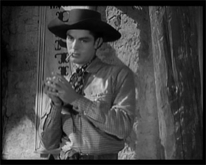Hero is exactly as good as everyone says it is — oh — then, well, curse you Stephen Hunter, for screwing up my schtick. Do these movie reviewers know no shame?
In point of fact, Hero is infinitely better than Stephen Hunter claims it is. More on the politics of Hunter in a nonce, so that those uninclined can skip that. First, we’ll meditate upon the movie, which is lush beyond imagining both in color (my second Christopher Doyle-lensed film in two nights, so if I am intoxicated with the magic of the projector, do forgive) and in martial arts. Lush is the proper word: I believe that the structure of the movie was concocted in order to provide the opportunity for Jet Li to fight Maggie Cheung more than once, and for Maggie Cheung to clash with Zhang Ziyi in more way than one, and if Donnie Yen only gets the one fight scene, well, it’s one of the better ones in the movie.
Yes, of course they’re good martial arts scenes. Jet Li is a master, Zhang Ziyi is getting her feet under her, and everyone else has been around Hong Kong long enough to know exactly what they’re doing. I.e., not only can they wield their swords and spears and fists with athletic grace, they can continue acting while they do so. Each motion has, as purpose, both furthering the flow of the battle and heightening the intimacy of the emotions.
It’s stylistic as all get out, so you shouldn’t expect Kill Bill; Zhang Yimou is building on top of the Shaw Brothers engendered tradition of historical martial arts movies, not imitating them. Thus, while Jet Li and Donnie Yen battle as fiercely and as quickly as anything you’ll see on screen this side of Ong Bak, the camera is as interested (not more) in the way the water drops onto the stone courtyard in which they fight as it is in the swords. It’s a duet.
And it’s very beautiful. Again: Christopher Doyle, and so on. I’d start to think that he was a one-trick pony, said trick being exquisite color filters, except he’s not; vide The Quiet American. I don’t think he could make a grungy movie, but there are plenty of people who can and not enough who can capture the light filtering through a dozen falling silk curtains the way he can, so it all works out and balances.
Now the politics are about to start. Be warned.
I am inclined to agree with Stephen Hunter when he says that one should not kill thousands of people in order to attain peace. As he says, “That’s the justification of all tyrants — tyrants in nations and tyrants in offices…” However, I wonder if he agrees with himself; one might ask, with some justification given that he takes a shot at Kerry in the course of the review, whether or not he thinks it was worth killing 10,000 Iraqis in order to attain peace in Iraq. Or, closer to home, whether he approves of Abraham Lincoln’s decision to start the Civil War.
He fails to note that, whatever the failings of the King of Qin, Qin is not the country employing three deadly assassins. (In fact, aren’t Flying Snow, Broken Sword, and Long Sky terrorists?) But then, it’s easy to decide that the victors were the bad guys from a perspective two millennia in the future. I suspect, although it is merely speculation, that Mr. Hunter’s real quarrel is with Communist China and that he has failed to separate past from present. But that’s the danger of mixing politics with movie reviews —
And damn, there I go tripping myself again.
